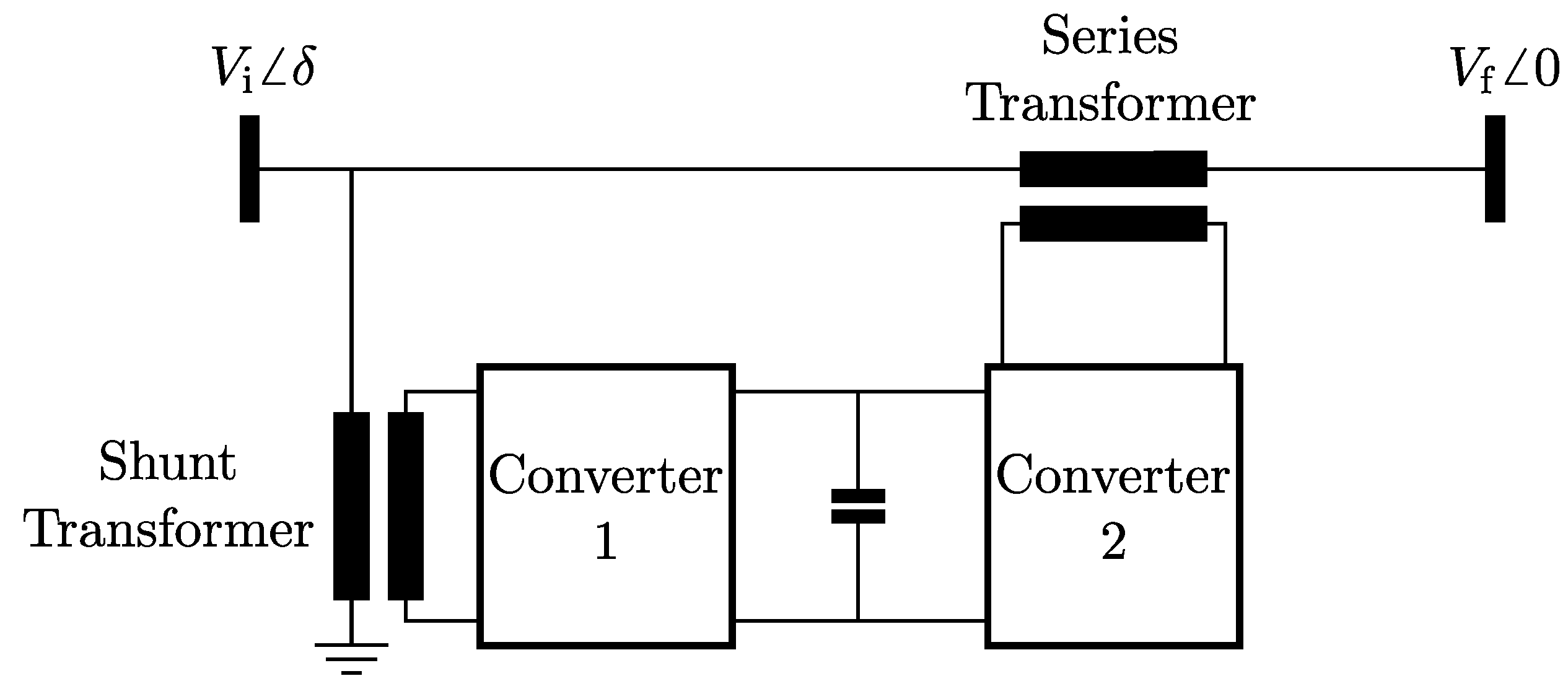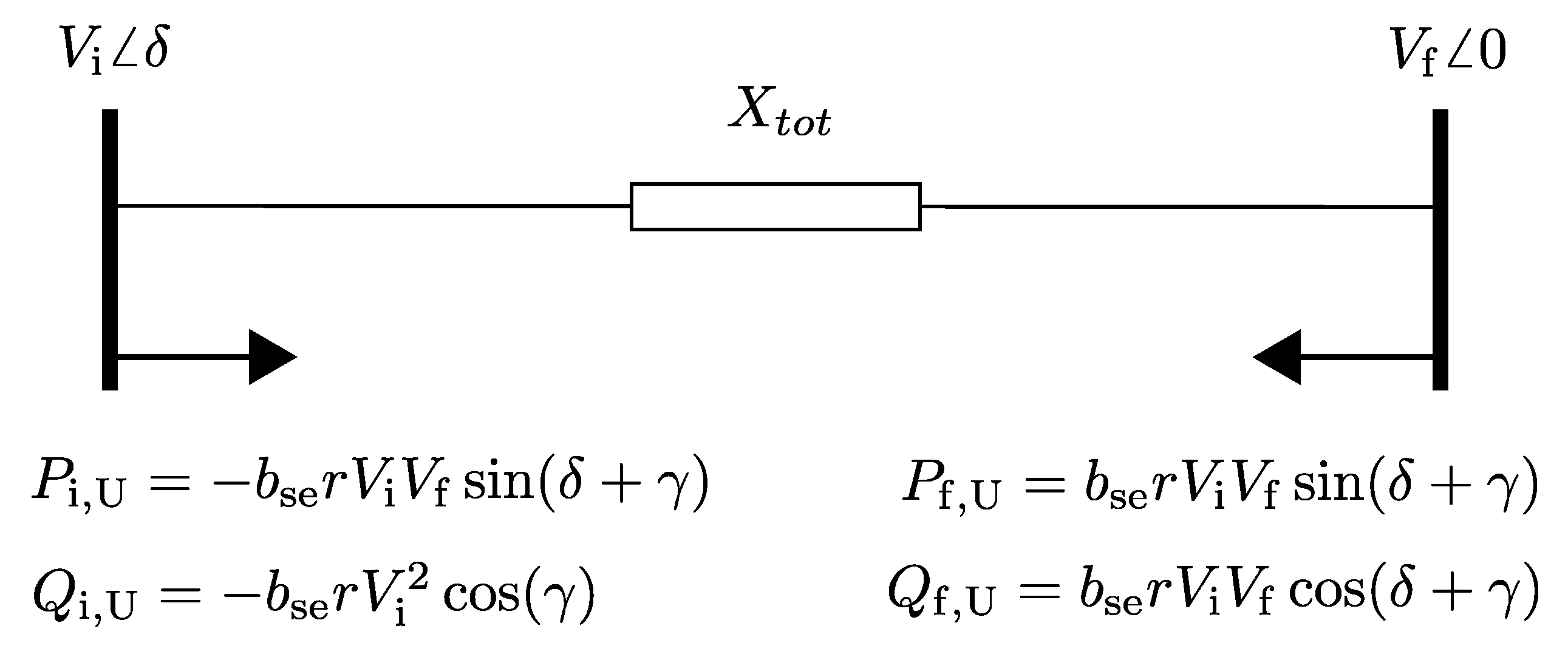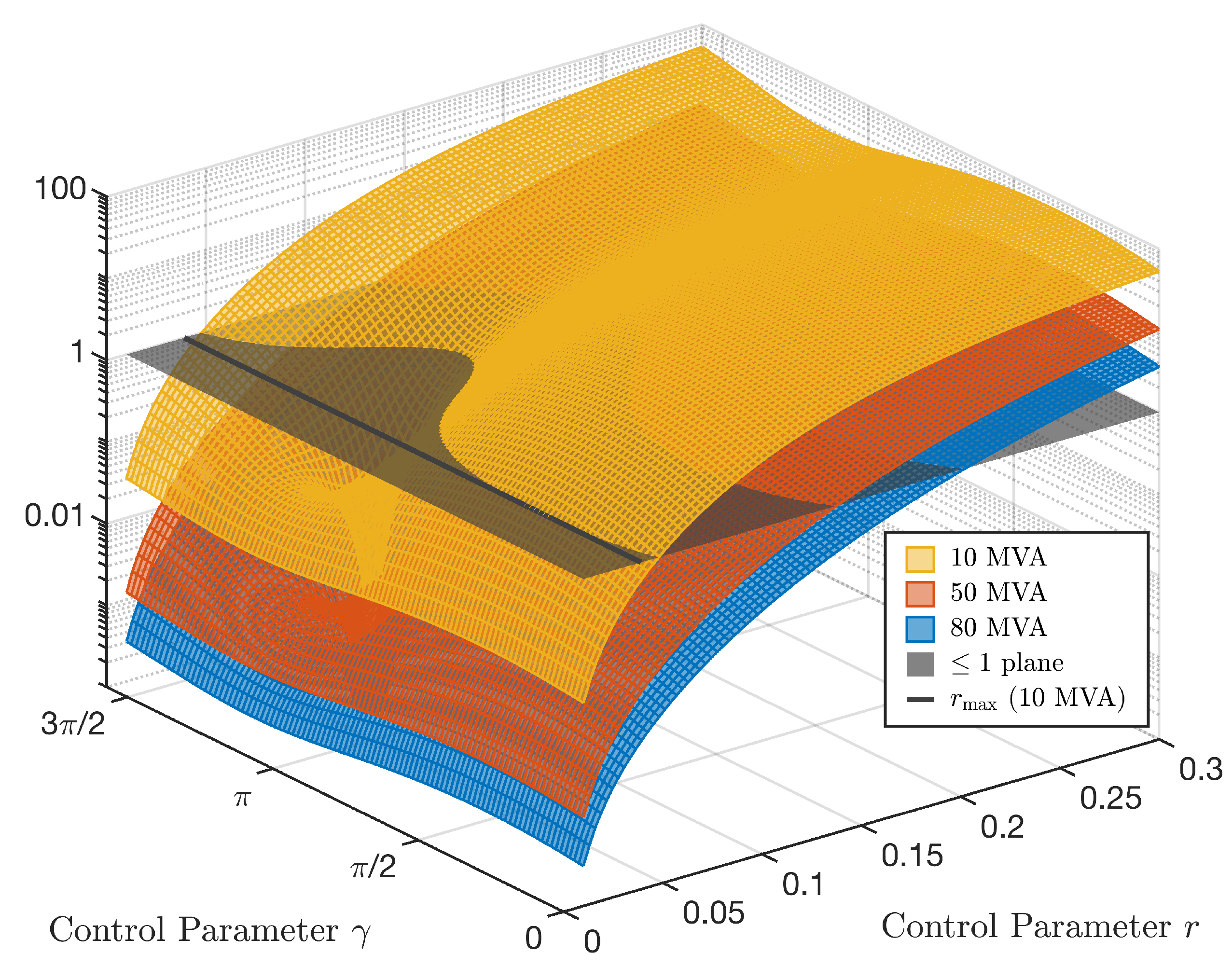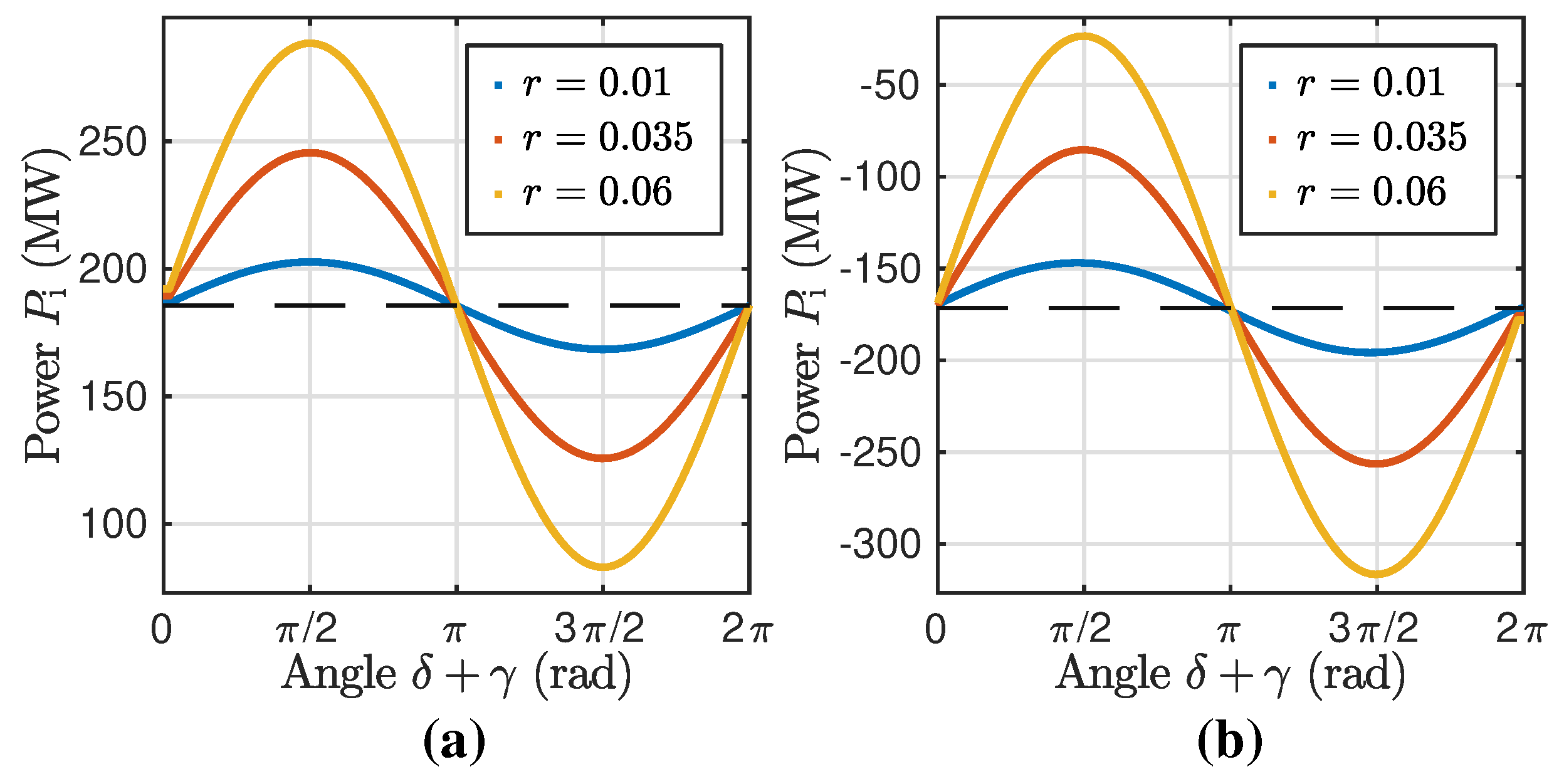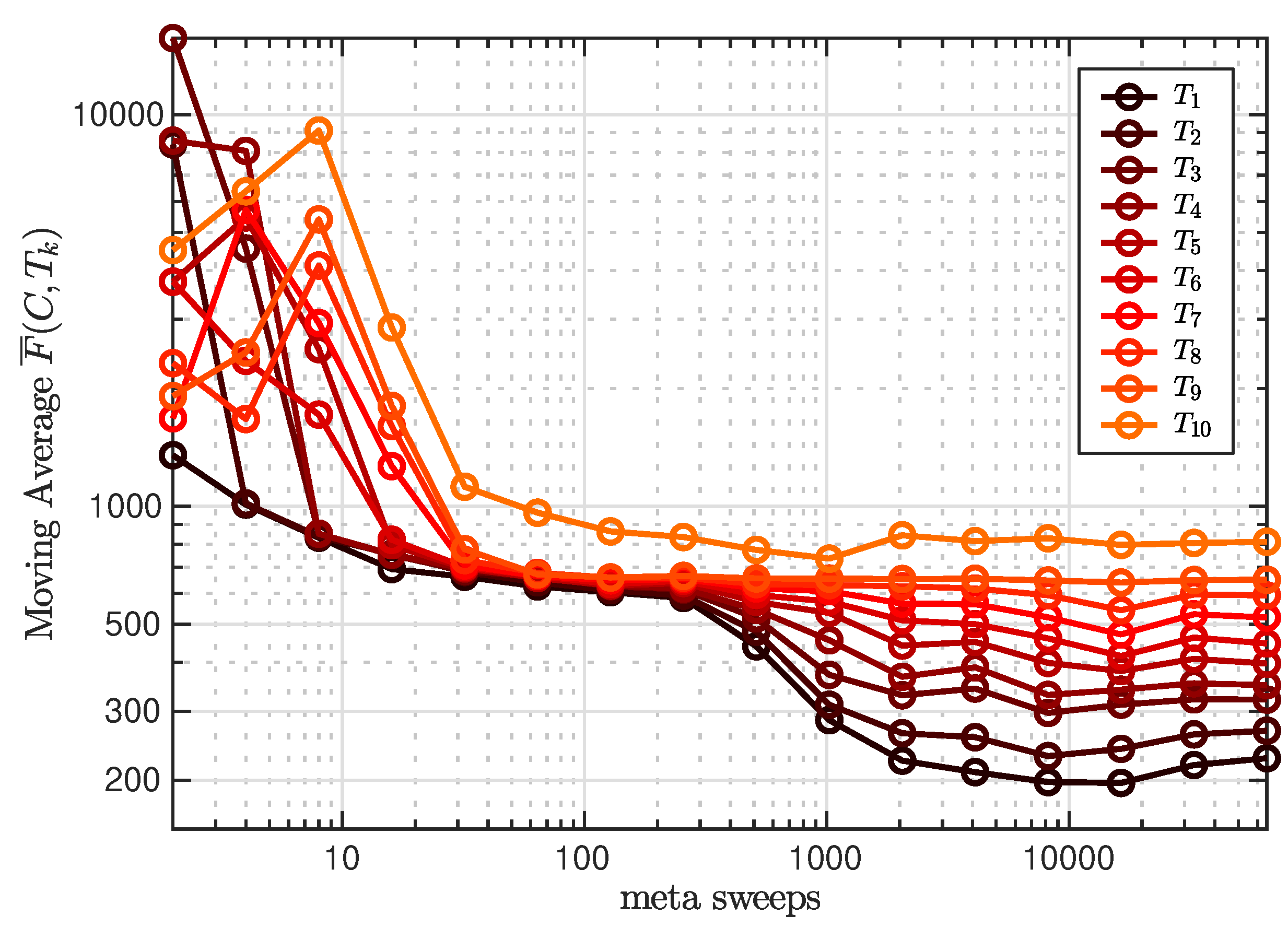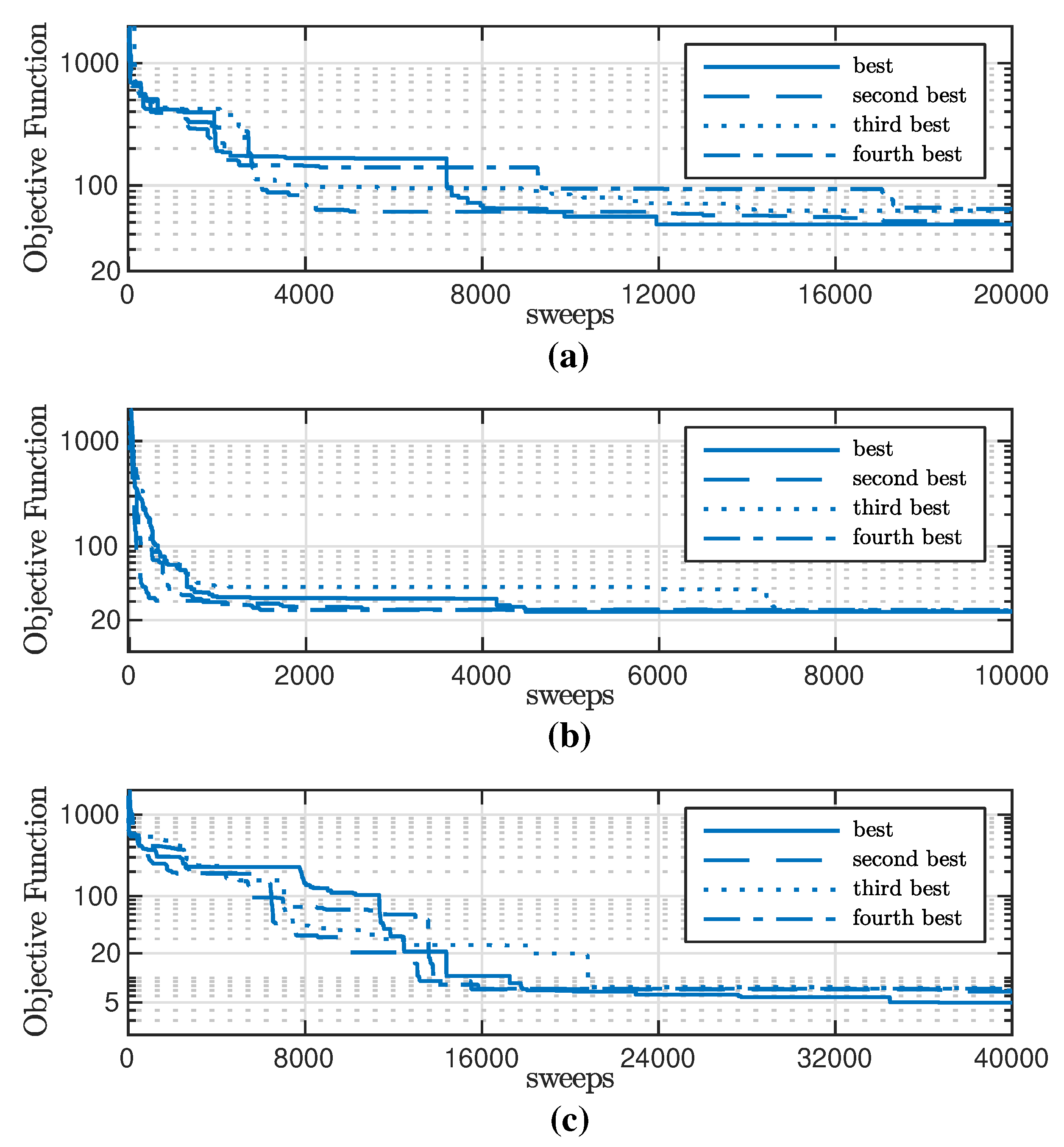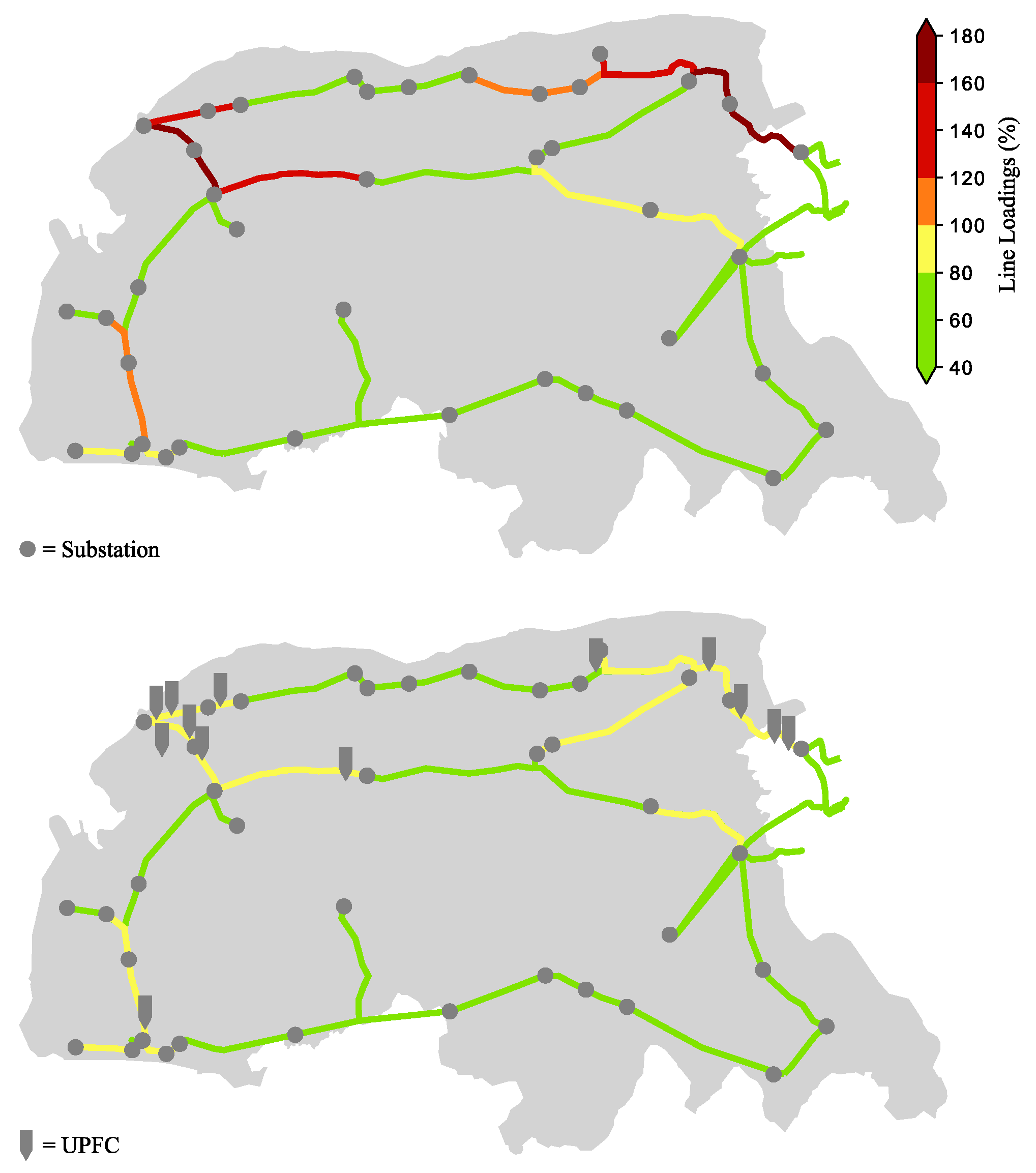1. Introduction
Due to the growing share of renewable energy sources (RES) in combination with its volatile nature, congestion in the power system, i.e., violations of voltage or thermal limits of grid elements, may occur more frequently [
1]. The increase in RE curtailment in Germany in recent years highlights this problem. To ensure secure grid operation, the demand of curtailment went up from
in 2013 to
in 2018 [
2]. According to §15(2) in the
Erneuerbare-Energien-Gesetz (German Renewable Energy Act , "EEG"), the associated costs of estimated 183
$ in 2014 and 635
$ in 2018 can be translated by grid operators into grid fees, resulting in high costs for society [
2, p. 161].To avoid these costs, the expansion of the power system plays a crucial role. However, several studies show that grid expansion and reinforcement alone is not an efficient solution to avoiding congestion both at distribution system level (110 kV) [
3] and at transmission system level (220 kV) [
4]. For this reason, the investigation of congestion management approaches is important to ensure a secure and efficient operation of the power system in the future.
In this paper, congestion management by means of power flow control (PFC) is investigated, as this approach comes with a number of advantages. In contrast to market-based approaches, where agreements between the grid operator and, e.g., flexible generators or consumers are necessary, no additional agreements are needed for PFC, as the grid operator directly controls the required resources. Furthermore, since PFC redirects power flows from heavily loaded lines to those with lower loads, a higher transmission capacity of the power system is achieved. The increased transmission capacity comes without the need to build new lines, which is another advantage of the technology, as this is of great interest for the public [
5]. It should be noted that, for PFC to be effective, free transmission capacities must be available in parts of the power system and that the use of PFC causes additional losses when power flows no longer adjust by means of the least resistance. Nonetheless, the literature recommends the use of PFC and refers to an implementation in the transmission system. It is argued that PFC can be implemented faster than grid expansion and can thus reduce congestion in the near future [
6, p. 4]. Moreover, in the long term, PFC should be taken into account in both the expansion planning and operation of the power system, as it enables a more efficient use of it [
6, p. 20].
Recommending PFC in the transmission system seems reasonable, since, in 2018,
% of the demand for curtailment occurred in the transmission system and
% of it occurred in the distribution system [
7, p. 34]. However, exemplary studies show that congestion within the distribution system will increase if the transmission system is expanded [
8]. For this reason, the question arises whether the use of PFC should also be considered in the distribution system.
The aim of this work is, therefore, to determine the potential of PFC to minimize congestion in a 110
distribution system. To achieve this goal, this work aims to find, by computer simulations [
9], an optimized configuration [
10,
11] of several Unified Power Flow Controller (UPFC) devices that minimizes congestion in the distribution system while taking into account costs. In addition, by neglecting the costs, the maximum potential of PFC to reduce congestion is evaluated. While optimising, the focus is not on the permanent operation of the UPFCs, but more on their arrangement. With regard to a permanent operation of UPFCs, various methods can be found in the literature [
12]. In [
13,
14], and [
15], optimization is carried out with regard to the number, placement in the power system, size, control parameters, and costs of the UPFCs. In [
13], exhaustive search is applied to maximize social welfare, and the authors in [
14,
15] apply particle swarm optimization and a genetic algorithm to maximize system loadability. This work extends the existing research by optimizing the number, placement, size, control parameters, and costs of the UPFCs to minimise congestion in the power system. To do so, this work applies the convenient and efficient
Parallel Tempering approach and a
greedy algorithm. In comparison to the literature, this work not only states the costs of a proposed UPFC application, but also relates them to the costs of the saved demand of curtailment.
One of the major contributions of this study is the proposal of two optimization variants, where in one case the number of degrees of freedom is reduced by integrating knowledge of the power system. As an example, the placement of UPFCs is no longer considered on all lines, but only on congested lines. Another major contribution is the further development of the Power Injection Model (PIM), which is used to model the UPFC. Not only is it explained how the PIM can be properly interpreted, but a calculation method for the series transformer reactance is also provided. Moreover, an analytical approach is developed that enables one to determine the allowed control parameters of a UPFC with respect to its operating limits in advance, replacing the iterative approach proposed in the literature [
16].
The developed methods allow one to identify an optimized UPFC application that minimizes congestion in a power system. By quantifying the reduction of congestion and calculating the remaining demand of curtailment, the potential of PFC to integrate more RE is demonstrated.
The remainder of the paper is structured as follows. At the beginning of
Section 2, why the UPFC is used for PFC in this work is explained, and the PIM is depicted. Afterwards, the developed methods and the optimization algorithms are outlined. In
Section 3, the results of this work are presented. The paper concludes with a summary of the most important findings and an outlook on possible future research.
2. Methods and Materials
A fundamental approach to the following methods can be found in the thesis [
17].
2.1. Choice of UPFC
According to [
18], resolving congestion depends on changing the line resistance
R, which is not considered in this work, and the current of a line [
18 p. 250]
Here, the tilde indicates whether the entity is complex, and
and
are the voltage magnitudes of the initial bus and of the terminal bus of the line, respectively. The angle between the two phasors
and
is
, where
is set as a reference phasor with angle 0. The impedance of the line is
, with
j as the imaginary unit. All entities in this work describe three phase entities if not marked explicitly.
The question is whether changing one of the variables is superior to changing one of the others in order to resolve congestion. The literature addresses this question and introduces the maximum system loadability. It is defined as the maximum amount of power that the grid can supply without overloaded lines and with acceptable voltage levels, if all loads and active power of the generators (e.g. RE) are iteratively increased in the same ratio. It turns out that combining different Flexible AC Transmission Systems (FACTSs) regulating different variables results in a higher maximum system loadability [
19]. The maximum system loadability is a comparable measure for the objectives of this work. It is therefore assumed that, in order to carry out the most effective PFC, different variables should be changed on different lines. The Unified Power Flow Controller FACTS device can control
,
,
X, and
individually or simultaneously. The question of whether a combination of variables should be changed per line does not need to be investigated, since, with the following optimization, a simultaneous change in the variables will result if it is advantageous. The authors are aware that there are other devices for PFC in addition to the UPFC. However, for the above reason, and taking into account the comparison of different FACTS devices in [
15] and [
19], the UPFC is selected as the most suitable device to determine the maximum potential of PFC. The basic setup of a UPFC is depicted in
Figure 1.
A series transformer is connected to the line in series, and a shunt transformer is connected to the initial bus of the line or to the line itself. The AC/DC-converters are connected via a DC link [
16].
2.2. Power Injection Model of UPFC
Among the many different models available for UPFCs, the PIM according to [
16] is chosen because it can be easily integrated into stationary power flow analysis. The derivation of the PIM is based on the main functionality of the UPFC, namely, the series voltage source injection on the line. The series voltage source can be controlled in magnitude and phase:
where
and
are the control parameters of the UPFC [
16]. The basic idea of the PIM is to represent the functionality of a UPFC by additional load and generation at the buses of the line. The model is depicted in
Figure 2. Here,
is the active power, and
is the reactive power injection at the initial bus of the line.
and
are at the terminal bus. In the following two subsections, it is discussed whether
P and
Q represent load or generation, and
is determined.
2.3. Interpretation of PIM
To identify whether the expressions in
Figure 2 represent load or generation, the series voltage source is again considered. If it is placed at the beginning of the line, the voltage on the line after the series voltage source is
The apparent power at the terminal bus of the line can then be expressed as
with
where
is the reactance of the line, and
denotes the reactance of the series transformer, which is determined in the next section. For the active power at the receiving bus and for
, it follows that
where
is used. In [
18, p. 251], the active power of a line without additional series voltage source at the terminal bus is determined as
Equation (
6) thus shows that, for
and for small
, both positive and negative, the power at the receiving bus is increased by using a series voltage source. To model an increase of
by additional power injections,
and
in
Figure 2 must be interpreted as loads, because, for
and for small
, both positive and negative, they then represent an additional generation at the initial bus and an additional load at the terminal bus, which leads to an increase in
. Thus, interpreting the equations in
Figure 2 as loads ensures correct modeling in accordance with (
6). This interpretation is in contrast to [
16], where
corresponds to a decrease in the active power flow along the line.
2.4. Calculation of Reactance in PIM
In
Figure 2,
is determined as follows:
where
can be regarded as given. The reactance
of the series transformer, which is regarded as lossless, is represented by the short circuit reactance [
20]
Here,
is used in accordance with [
21, p. 2] and [
20, p. 17]. Index a indicates single phase entities, such as
as the rated current and
as the rated voltage of the series transformer. The latter is set to equal the maximum voltage magnitude that Converter 2 can supply, according to (
2)
The simplification
is appropriate, since the bus voltages encountered in this work are close to 110
. Furthermore, it follows that
with
as the rated power of the series transformer. Inserting (
11) and (
12) into (
10) yields
can be taken as given, since the optimization dictates it. Finally, in order to calculate
,
must be specified. Next, it is shown that
and can therefore not be chosen arbitrarily.
2.5. Operational Limits of UPFC
The operational limits of a UPFC can be expressed in terms of the rated powers
and
of its converters
where Index
indicates Converter 1 and Index
indicates Converter 2. It is assumed that the rated power of the converters is equal and that the UPFC transformers have the same rated power:
with
as the rated power of the shunt transformer. As the UPFC cannot generate or absorb active power,
must hold. In [
16], regarding the PIM, it is assumed that
. With (
15), (
14) simplifies to
In the following,
is referred to as the size of the UPFC. In [
16], the active power and reactive power of Converter 2 are determined as
Inserting this into (
16) and applying (
9) yields
where
in (
13) is set as equal to
r in order to determine for which values of
r and
the expression is satisfied. At this point,
is defined as the maximum value of
r, which fulfils the above inequality for
. By deploying this
, the operational limits of the UPFC are never violated for any value of
. It follows that, before applying the PIM, a UPFC size
must be chosen, from which
is determined to calculate
.
Figure 3 illustrates the left-hand side of (
18) for an exemplary line with
,
,
, and
. Three different power ratings of the series transformers are considered. For a
series transformer, the grey line in the figure represents
. It can be seen that values of
also fulfil the inequality.
For the following investigations, (
18) is evaluated for each line in the 110
distribution system, for the series transformer power ratings appearing in this work
and for
steps each in
and
.
2.6. Optimization of UPFC Configuration
If more than one UPFC is to be installed in a power system, several questions arise. The number of UPFCs, the placement in the power system, the size of the devices, and the control parameters r and cannot be determined trivially. Therefore, optimization is carried out, and two optimization approaches are developed.
First, for a restricted optimization denoted as
, the number of UPFCs and their size will be determined by means of optimization, see also
Table 1. For the placements, only congested lines are considered, and
is specified. Together with
, the active power flow of the lines is minimized in this approach. In order to ensure a cost-efficient use of the UPFCs, costs are optimized as well. This optimization variant integrates knowledge of the power system’s lines and the UPFCs’ operation.
For a more comprehensive optimization denoted as , all lines of the power system and control parameters of and are considered for a UPFC installation.
2.7. Objective Function
For the optimized power system integration of UPFCs, an objective function is defined. The summation of two terms, with
describing the costs of a UPFC configuration and
quantifying congestion in the grid model, yields for the objection function
Here,
describes the investment costs of UPFC
i according to [
22]:
where
is the number of UPFCs added to the distribution system, and
is the weighting factor of
L. The function
L maps the violations of voltage and thermal limits of the grid elements, i.e., the congestions. It is defined as
with
as the number of lines and
as the number of buses in the power system.
maps each violation of the thermal limit of a line and is defined as
where
is the loading of the line in %, and
is a weighting factor. The above equation is divided and subtracted by 100 to obtain comparable values with respect to
. The latter describes the extent to which the violation of a single bus voltage limit contributes to
L and is defined as
where
is the voltage magnitude of a bus given in p.u. The violation of a bus voltage limit can be weighted with
.
Throughout the work,
and
are set. This allows the investigations to focus on line congestion, as, with these weighting factors, bus voltage violations are less likely compared to thermal limit violations. In fact, no violations of bus voltages were observed in the results.
is set across the work, so that
is in the same order of magnitude as
. For a better handling, the objective function is scaled:
2.8. Configuration of Unified Power Flow Controllers
The subsequent optimization algorithms start with a random initial configuration of UPFCs. First, the initial number of UPFCs
is to be determined. It is important to note that not all of the lines of the power system can necessarily be occupied by a UPFC. If, for a certain line and for all possible sizes of a UPFC, no
in (
18) can be found, the line cannot be used for a UPFC installation. The maximum number of lines that can be considered is denoted as
. The number of UPFCs in the initial configuration
is therefore chosen randomly from
. Each UPFC
i for
is finally assigned randomly to a line
and a size
. For the
optimization, a value
is chosen from
, and a value
is chosen from
, with
being a natural number.
Let
C be a configuration of UPFCs, which is modified to
:
During the optimization process from a given
current configuration, trial configurations are created by random changes, which might become the next current configuration.
variables indicated with a dash are changed with a probability according to
Table 2. The table does not describe direct changes to the UPFC positions, but changes to the number
of UPFC. This effectively allows for UPFC installations on changing lines, since, for
, new UPFCs at randomly chosen unoccupied lines are added to the configuration, and, for
,
, UPFCs are deleted randomly from
C. Within the
variant,
and
are only changed with new UPFCs added to the configuration.
2.9. Metropolis Algorithm
In [
14], a genetic algorithm and particle swarm optimization are used to optimize the variant
. By employing the Metropolis algorithm [
23] and Parallel Tempering [
24,
25], in this work, a simpler implementation is obtained.
The Metropolis algorithm is part of the subsequent Parallel Tempering approach. The algorithm is based on the Boltzmann factor , expressing the probability that a physical system exhibiting a temperatureT is in a certain energy state E. Here, the energy of a configuration is described by F, and the temperature is the parameter that controls the fluctuations within the optimization process.
The Metropolis algorithm starts with a random initial configuration C. A sweep of Metropolis algorithm is given by the following:
If the Metropolis algorithm is not applied as part of Parallel Tempering in the following, it is performed for very low temperatures as a
greedy algorithm. A greedy algorithm is one that is choosing the locally optimal choice at each step. While this is in general not guaranteeing to find the global optimum of a problem, the local optimum found can often be a good estimator of it and can be found within reasonable computational effort. Here,
is used such that
is basically only accepted if
. Thus, the greedy algorithm will converge to local minima close to the initial configuration. This approach works well if the configuration space is rather simple [
26], exhibiting few local minima. Such problems are called
easy; otherwise, they are called
hard. To minimize
F, the increments
and probabilities
p are chosen in such a way that, for configurations with a converging
F, only small changes are made; see
Table 3.
describes the optimization of
by the greedy algorithm, and
describes the optimization of
.
2.10. Parallel Tempering
Often, genetic algorithms are used to optimize [
10,
11] the application of FACTSs in power systems [
15,
19,
27,
28]. For genetic algorithms, however, selection, crossover, and mutation operations must be determined, involving a proper choice of various algorithmic parameters. Parallel Tempering exhibits basically one type of control parameter, which can be determined by straight-forward rules of thumb.
Parallel Tempering [
24,
25], also known as Replica Exchange Markov Chain Monte Carlo Sampling or Metropolis-Coupled Markov Chain Monte Carlo, regards
K replicas of the same system. In this work, each replica is a configuration
of UPFCs for
. Initially, each
is assigned to a temperature
, where
. A number
m of
meta sweeps are executed repeating the following steps:
-
For each
at
, the Metropolis algorithm is executed
times, where
l is the number of degrees of freedom in which
can be changed, and
is the expected value of degrees of freedom to be changed per sweep.
Here, l concerns the four columns of the length of each configuration and the additional degree of freedom .
-
A value
k is chosen randomly
times from
. Each time, configuration
, assigned to
, is swapped with
, assigned to
, with probability
where
If a swap is accepted, is assigned to and to ; otherwise, the configurations are not affected.
For each temperature
in the increasing sequence
, the four increments
and probabilities
, see
Table 2, are set as follows.
For each Metropolis algorithm performed at , as a rule of thumb, about half of the change attempts should be accepted. If 100% of the changes were accepted, this would be possible only with very small changes, and the algorithm would not be able to find solutions that are very different from the initial configuration. However, if too many or too strong changes are made, no new changes will be accepted. Therefore, by adjusting , , and , an acceptance rate of is targeted for the changes within the Metropolis algorithm. The same argumentation applies for the swap attempts within Parallel Tempering, and an acceptance rate of is aimed at guiding the selection of the temperatures. Moving pairs of temperatures closer to each other increases , while separating them more decreases the rate.
The selection of suitable values , , and requires some trials. The statistics on acceptance rates are measured when Parallel Tempering is in equilibrium at the upper half set of temperatures . Equilibrium is considered to be reached at temperature if the objective function converges as a function of the number m of meta sweeps.
Within Parallel Tempering, each performs a walk in temperature space. While being at a low temperature, can approach local minima, because and within the Metropolis algorithm are set to make only small changes to the configuration. At high temperatures, and are chosen in such a way that exhibits many fluctuations by the Metropolis algorithm and thus manages to escape local minima to visit other regions in the space of possible configurations. Therefore, Parallel Tempering is guaranteed to find very low-lying local minima or even global minima, regardless of whether an optimization problem has a simple or complex structure.
The sequence of visits of a configuration from the highest to the lowest temperature and back is called a round trip. Each round trip can be considered independent of the previous one, because the highest temperature , , and are chosen such that the changed configuration resembles a randomly drawn one. At least 10 round trips for are targeted. In each round trip, the configuration with the smallest value of F is stored to find the best UPFC configurations.
Below, optimized by Parallel Tempering is indicated as . The optimization variables of are given in the appendix.
2.11. Grid Model
Being part of the ENERA project, the 110kV distribution system grid model is provided by the Avacon Netz GmbH. The model is based on the year 2016 and is extended according to [
8], e.g., by a strong expansion of RE. Since in this work the arrangement of the UPFCs is of interest, rather than their permanent operation, only a critical grid state is investigated. This critical grid state is referred to as the reference case. Note that both the PIM in
Figure 2 and (
18) are calculated using load flow results from the reference case.
The grid model consists of 141 lines and 99 buses. Simulation was performed in DigSILENT PowerFactory 2020. After performing a load flow calculation of the reference case, (
18) can be evaluated for each line. As a result, for the
variant,
was obtained; for
,
was found. Evaluating (
19) for the reference case yields
with
, since no UPFCs have been inserted yet.
2.12. Determination of Curtailment Demand
There are several methods to determine the demand of curtailment in a power system. Scenario 2 in [
29] optimizes the total amount of curtailed power, while keeping the practical implementation of curtailment in mind. It is applied to determine the curtailment demand of the 110
distribution system.
4. Conclusion
In this work, Parallel Tempering and a greedy algorithm were successfully applied to determine the optimal use of UPFCs to minimise congestion in a 110 kV distribution system. Two optimization variants were developed, where the integration of power system knowledge leads to better results faster. Contrary to expectations, the posed optimization problem was simple to solve and allowed for various investigations with the greedy algorithm. Furthermore, the cost of UPFCs was evaluated and related to the cost of the saved demand of curtailment. If costs are taken into account in the optimization, 98.64% of the congestion in distribution system and 73.2% of the curtailment demand can be reduced with respect to a reference case. This corresponds to 497.5 MW of additional RE integration. If costs are neglected, the maximum potential of PFC to reduce congestion is 99.13%. It has been shown that the use of PFC can increase the efficient utilization of power system assets. For this reason, the deployment of PFC should be considered as a complement to grid expansion in the future.
For further research, it would be worthwhile to adapt the developed methods such that curtailment, rather than congestion, is minimized. This was not considered because it requires more computing time. Furthermore, due to its low computing time, the greedy algorithm could be used to optimize the permanent operation of the UPFCs. Finally, motivated by the results, a comprehensive economic evaluation specifying the total investment costs and income of PFC could be carried out in further studies, facilitating an estimate of the return on investment.
Author Contributions
“Conceptualization, Max Bodenstein and Ingo Liere-Netheler; methodology, Max Bodenstein; software, Max Bodenstein; validation, Max Bodenstein; formal analysis, Max Bodenstein; investigation, Max Bodenstein; resources, Frank Schuldt, Karsten von Maydell, Carsten Agert; data curation, Max Bodenstein; writing—original draft preparation, Max Bodenstein; writing—review and editing, Max Bodenstein, Ingo Liere-Netheler, Frank Schuldt, Karsten von Maydell, Alexander K. Hartmann and Carsten Agert; visualization, Max Bodenstein; supervision, Ingo Liere-Netheler, Carsten Agert, Alexander K. Hartmann; project administration, Frank Schuldt, Karsten von Maydell; funding acquisition, Frank Schuldt, Karsten von Maydell. All authors have read and agreed to the published version of the manuscript.”
